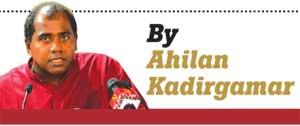Reply To:
Name - Reply Comment
- The continued use of force to quell the uprisings of the people, by mere justification in terms of what is legal, as opposed to what is socially and politically legitimate, can lead to the citizenry losing faith in the legal-constitutional order.
- There is a need for a new constitution for our times. The time for constitutional tinkering is long past. The way forward requires a constitution drafted by credible representatives in whom people have faith
The liberal democratic order in Sri Lanka is collapsing, and the problem is one of legitimacy. Sri Lanka is going through the most severe political and economic crisis in its post-colonial history. Its liberal democratic state, under stress for many decades with two major insurrections and a civil war, is now being shaken by a crisis of legitimacy.
through the most severe political and economic crisis in its post-colonial history. Its liberal democratic state, under stress for many decades with two major insurrections and a civil war, is now being shaken by a crisis of legitimacy.
The liberal democratic order in any country is a fragile one, where those in power ensure their hegemony through a combination of leadership ensuring the consent of people combined with the use of coercion. Liberal rule then depends on a combination of ideological, political and legal mechanisms. What we are seeing in Sri Lanka now is a tremendous collapse of legitimacy of the political leadership, compensated by the repressive apparatuses of the state characterised by the militarised security sector and the draconian criminal justice system. This state of affairs is unsustainable.
The election of the president by parliament, the imposition of the state of Emergency and the recent crackdown on activists are justified by claiming they are legal. However, legality without social and political legitimacy is on thin ice and in danger of collapse. Such dangers are all the more present for a country going through a severe economic crisis. I am reminded of the saying that every country is only nine meals away from anarchy. Sri Lanka is at the crossroads, and the main factors determining its path ahead are issues of leadership, legitimacy and the aspirations of its citizenry.
Liberal democratic order
At the heart of the liberal democratic order are issues of security of the person and property. Political philosophers such as Thomas Hobbes justified the tremendous powers of modern states with respect to their subjects because of the great fears people had about their security and the protection of their property. These thinkers argued that if the state was to collapse, it would be anarchy and every individual will have to fight for their own survival. Thus, liberal democratic states and the stability they provide are to a large extent based on fear, both of our neighbours and our neighbouring states.
 The problem is that such fear at least in relation to losing property becomes meaningless when inequalities rise to the extent that property is exposed as belonging only to a narrow class. Furthermore, if hunger and starvation set in, where the integrity and survival of the person itself come under question, fears about the security of person and property become meaningless. Such a situation turns into the causes behind, and the times of, food riots first, and great social and political changes later.
The problem is that such fear at least in relation to losing property becomes meaningless when inequalities rise to the extent that property is exposed as belonging only to a narrow class. Furthermore, if hunger and starvation set in, where the integrity and survival of the person itself come under question, fears about the security of person and property become meaningless. Such a situation turns into the causes behind, and the times of, food riots first, and great social and political changes later.
In this context, the recent attacks and arrest of the protestors by the state have been justified on the basis that they supposedly vandalised public property. However, the collapse of the liberal democratic order can lead to the people taking over even private property. Indeed, with the deteriorating economic situation, the great revolt underway challenging the legitimacy of the political leadership in this country can turn revolutionary by challenging private property relations, which is at the foundation of liberal democratic states. Furthermore, the continued use of force to quell the uprisings of the people, by mere justification in terms of what is legal, as opposed to what is socially and politically legitimate, can lead to the citizenry losing faith in the legal-constitutional order.
People’s great awakening
The great political awakening of the people underway with protests that are unprecedented in the last two centuries, cannot be stopped with repression. It requires a major political process of system change and a reckoning with the fast-collapsing liberal democratic order. This is not just about a few activists in Galle Face, even if they have helped galvanise the protests. The politicisation of the masses has reached far and wide.
There is also the urgent need of addressing the economic depression. That requires immediate economic relief to the people and stimulus for livelihoods, particularly in agriculture to address the food crisis. A new economic trajectory requires an altogether different course with drastic changes to the economic role of the state. I have written on those issues in the past and will do so going forward.
What I wish to address here, is that we have no option but to work towards political system change to address the liberal order under incredible strain. The executive presidency heaping tremendous powers on one individual must be abolished. The parliament has lost legitimacy and without a fresh mandate through elections, the legitimacy of the parliamentary system itself is coming under risk.
The constitutional order and the way in which the political elites in this country have used it to their advantage has led to a collapse of popular support. There is a need for a new constitution for our times. The time for constitutional tinkering is long past. The way forward requires a constitution drafted by credible representatives in whom people have faith. It may require a constituent assembly, in which those who participate should be barred from being representatives in parliament for a period—say five to ten years—to avoid conflict of interest in the drafting process.
Such political system change will take time, and the people need to be given confidence that the political process is in the works. Such confidence-building measures should include repealing the state of Emergency, a moratorium on the use of the Prevention of Terrorism Act, ending militarised law enforcement by sending the military back to the barracks, and giving the citizenry space to engage the state by assuring freedoms of association and expression.
Sadly, the debate in parliament last week extending Emergency rule was in the opposite direction. The political class exposed xenophobic and ethno-nationalist polarising rhetoric combined with the revival of the terrorism discourse. However, these crass tactics used over the decades, and again employed by the currently discredited politicians, are unlikely to divert the people’s attention.
The consequences of not moving on political system change and seeking to divert the people’s attention will make the stakes in Sri Lanka much higher. It could lead to revolutionary times culminating in a political order of equality and freedom. Or it could turn into a state of anarchy, involving capture by fascist forces who polarise our society by instilling repression and destroying the country. The elite in this country who are complacent about the dangerous consequences of the current round of state repression and the refusal to consider political system change should be awakened to the realities facing the country.